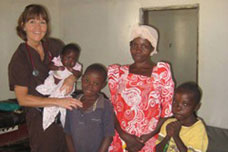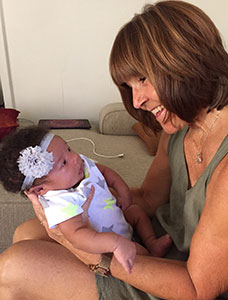 |
|
A UC Irvine-trained pediatrician's life comes full circle

NOTE: Dr. Catharina Wolde Yohanes, who joined our Pediatrics Residency Program in 1992, has kept in touch with her UC Irvine mentors over more than 20 years of world travel. Her story, in her own words, illustrates the skill, compassion, advocacy and fortitude a pediatrician can bring to her patients and her community, wherever that may be.
Born and raised in Sweden, I attended medical school at the Karolinska Institute in Stockholm. While in the Sudan as working as a medical student in the early 1980s, I met my husband to be. He was a native of Ethiopia who got political asylum and moved to the United States in 1981. After two years of interning in a small Swedish town, I joined him in 1985 in Southern California with a Swedish medical license in my pocket.
To practice medicine here, I first had to pass rigorous exams for foreign medical graduates (ECFMG). I worked as a medical assistant and had my first child, Theresa, who is now in her 30s. We spent time raising Theresa and a second child, Mikael, who is nearing 30.
While I was studying to complete my ECFMG exams and be eligible for a California medical license, we decided to settle in Sweden in 1988, where one of us would always be at home with the children. After two years in an obstetrics and gynecology residency program at Karolinska Hospital, we decided to return to Southern California in April 1990. With recommendations from my children's pediatrician, I "matched" with UC Irvine's pediatric residency program in July 1992.
 Just nine months earlier, we had our third child, Anna, who is now in her late 20s. I recall long commutes between UC Irvine Medical Center and Miller Children's Hospital in Long Beach, with three children ages 6 and under, and a very supporting husband. Unfortunately he was diagnosed with a serious malignancy in early 1994, and for a year-and-a-half we fought together for surgery and other treatment options. Halfway through my three years of pediatric residency, I was forced to work part-time and take a leave of absence.
Just nine months earlier, we had our third child, Anna, who is now in her late 20s. I recall long commutes between UC Irvine Medical Center and Miller Children's Hospital in Long Beach, with three children ages 6 and under, and a very supporting husband. Unfortunately he was diagnosed with a serious malignancy in early 1994, and for a year-and-a-half we fought together for surgery and other treatment options. Halfway through my three years of pediatric residency, I was forced to work part-time and take a leave of absence.
Those were difficult years. Six months after my husband's passing, I resumed the residency program full-time in spring 1996. The kids were in a home day-care with a wonderful woman we still keep in contact with. Our children still remain close friends today. I also had much support from people at Lutheran Church of the Cross in Laguna Hills and other friends in Orange and San Diego. I chose to stay here because my husband’s family and young cousins lived in Pasadena, where my children could connect with their Ethiopian relatives and culture.
After I completed my pediatric residency in March 1997, I took temporary part-time positions in general pediatrics around Orange County, including at Kaiser Permanente. Along the way, I learned Spanish while serving clinics in underprivileged areas, It was impossible to work full-time or enter a fellowship in a pediatric subspecialty because my children, who have always been my highest priority, needed me after school.
I continued to work in outpatient pediatrics then joined a private practice conveniently close to our home. I had to make life practical, stable and easier for the four of us during the 12 years I worked in Orange County.
I liked following my patients from birth into childhood and their teenage years. I also incorporated in my daily practice, parent support and education, first-time parenting instruction, child safety and prevention. It was a nice and rewarding mix of community pediatrics.
Then in 2009, I got a chance to form a team of volunteers to work at a medical clinic in rural Uganda. My long-time dream of returning to Africa as a medical doctor came true. Upon our return here, we formed a small not-for-profit organization based in Orange County. I have returned to Uganda annually since then, seeing the progress made with well-spent contributions from generous donors.
I was also a part of another volunteer team that went to Haiti after a devastating earthquake in 2010.
I find the work we can do in developing countries — and the satisfaction that comes with of seeing people recover from illnesses that easily could kill in those environments — fulfilling and inspiring. The smiling faces of children and their parents when they are recovering from malaria, typhoid fever or pneumonia — among other preventable and easily treatable diseases — is worth all the hard work, sleepless residency call nights and years of study.
However, as physicians we can never sit back and consider that we are fully educated, which is part of our ever changing and exciting profession.
Since 2012, as an "empty nester" whose children were off to college in New York City and Europe and with an aging mother in Sweden, among other reasons, I accepted a temporary position at Women's and Children's Health Department at Uppsala University Hospital in Sweden. As an academic center interested in global health and international medicine, I felt it would be a perfect place to expand my views and career plans to learn about infectious diseases and tropical medicine.
Joining Doctors Without Borders (Medicins Sans Frontiers) had also been one of my goals. I joined the organization in 2013, which was easier to do with the long vacations and opportunities for paid leaves, benefits that are available in Sweden.
My first mission took me to India. The project was to build and run an intensive care unit for acutely malnourished children in Bihar, one of the poorest states. Working with such organizations may only be possible during certain periods of our careers, but there are windows of opportunities — even after retirement. For example, I met a 63-year-old nurse from Africa who had been on 18 missions with Doctors Without Borders all over the world.
After 5 months in India, I had to cut short my stay to tend to my ailing mother in Sweden. I also returned to the outpatient pediatric specialty office affiliated with Uppsala Hospital.
Life takes unexpected turns — some we can control, others we just have to accept. They may set us back and we may never forget, but we can chose to cherish the memories and move on toward new horizons, adventures, experiences, new friends and relationships.
My life has been a full and challenging one, and I feel satisfied and blessed for the opportunities I've been provided. My first grandchild arrived in 2016 and I am still working in the pediatric specialty office in Sweden. I have also met and now live with another wonderful man from Ethiopia,
One might say that my life has come full circle.